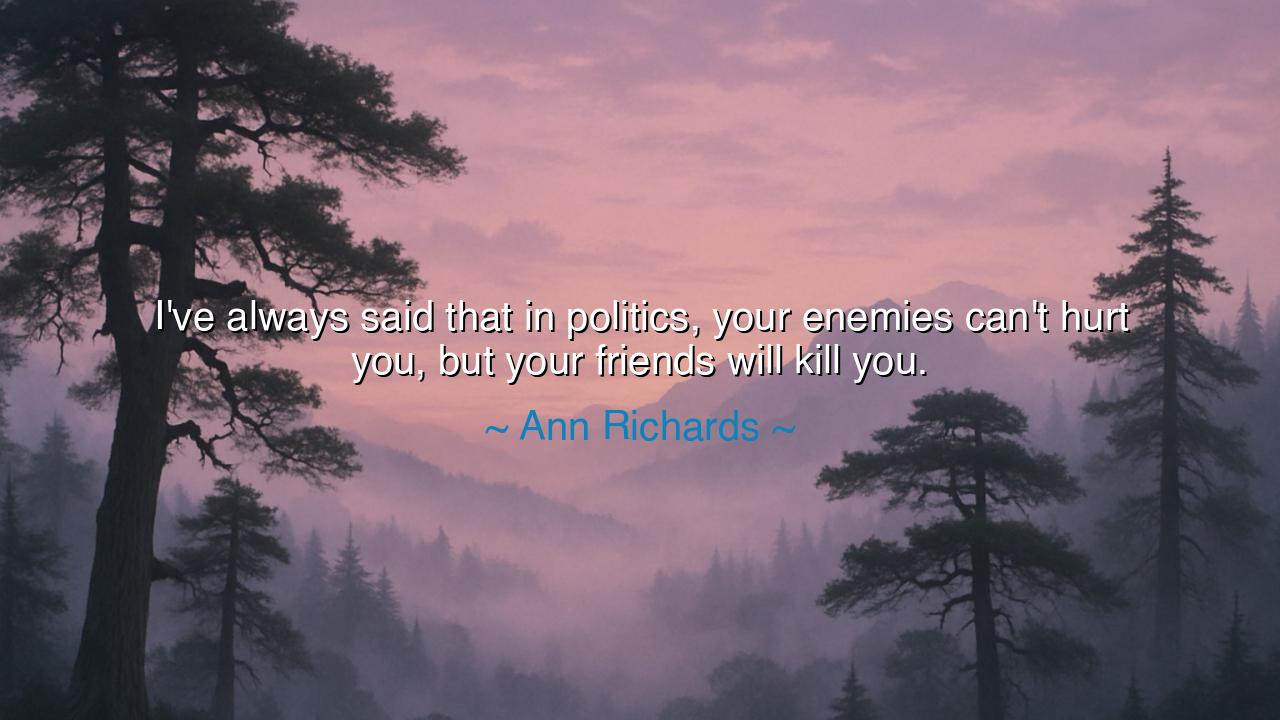
I've always said that in politics, your enemies can't hurt you
I've always said that in politics, your enemies can't hurt you, but your friends will kill you.






Ann Richards, with the sharp vision of one who knew the tempests of power, declared: “I’ve always said that in politics, your enemies can’t hurt you, but your friends will kill you.” These words pierce like an arrow, for they reveal the hidden danger that lies not in open opposition, but in betrayal cloaked with the mask of loyalty. The enemy strikes from without, and their blow can be seen and parried. But the friend, moving in closeness, carries the power to wound where the armor is thinnest—within the circle of trust.
In the realm of politics, this truth resounds across centuries. Enemies are expected; their hostility sharpens vigilance. But friends, when turned false, disarm the spirit and strike at the heart. Such betrayals are more devastating than any open attack, for they sever bonds of faith and unravel the very fabric of alliances. Richards, a warrior of American politics, spoke from the battlefield of experience, where ambition and rivalry often cloak themselves in the garments of camaraderie.
History confirms her wisdom. Consider Julius Caesar, whose power grew vast and whose enemies trembled before him. None of them destroyed him. It was not the swords of foreign foes that ended his reign, but the daggers of friends—Brutus, Cassius, and others—men he trusted, men he had raised in favor. The wound of betrayal was so deep that even his dying words carried the sting of disbelief: “Et tu, Brute?” In that moment, the ancient truth was written in blood: the betrayal of friends is more fatal than the hatred of foes.
The teaching extends beyond Rome. In every age, rulers and leaders have fallen not because of the plots of their enemies, but because their friends, consumed by jealousy, ambition, or fear, turned against them. It is a reminder that in the treacherous sea of politics, loyalty is fragile, and trust must be guarded with wisdom. A leader may survive the assaults of opposition, but rarely do they survive the betrayal of their own household.
Thus, Richards’s words endure as both warning and counsel. Let no one be deceived into thinking that safety lies only in defeating enemies. The greater danger often lies in those who share our tables and echo our laughter. To lead is to live with vigilance, to discern true loyalty from false, and to remember that the most grievous wounds are dealt not by the sword of an enemy, but by the hand of a friend.






TTLuc Thanh Tam
Ann Richards’ statement is a sobering reminder of the treacherous waters politicians must navigate. Can we interpret this as a cautionary tale about the unpredictability of political allegiances? In a system where allies may be more dangerous than enemies, how does one maintain integrity and trust without becoming paranoid or overly cautious? How do politicians preserve their political relationships without them becoming a source of potential harm?
SPSony Pham
Richards’ quote highlights the danger of trust in politics. Is it possible to truly trust anyone in the political realm, especially when personal ambition and competition are at play? If political friends can hurt you, does that mean the very nature of political alliances is inherently unstable? Could this be why many political figures end up isolated, unable to rely on anyone but themselves for survival in such a volatile environment?
HNViet Ha Nguyen
This quote by Ann Richards speaks to the often-cutthroat nature of politics, where allies can become your greatest threat. Could this be a reflection of how power dynamics work in politics, where friends may feel threatened by your success and turn against you? How can politicians navigate these dynamics while maintaining trust within their inner circles without being undermined? Is it possible to have genuine friendships in the world of politics?
VLMy Ngan Vu Le
Ann Richards' quote is a sharp commentary on the fragility of political careers. It makes me wonder if, in the world of politics, betrayal by those closest to you is often more dangerous than attacks from your enemies. How do political leaders balance loyalty within their own circles without compromising their principles? Is it inevitable that political allies will eventually turn against one another as personal ambitions clash?